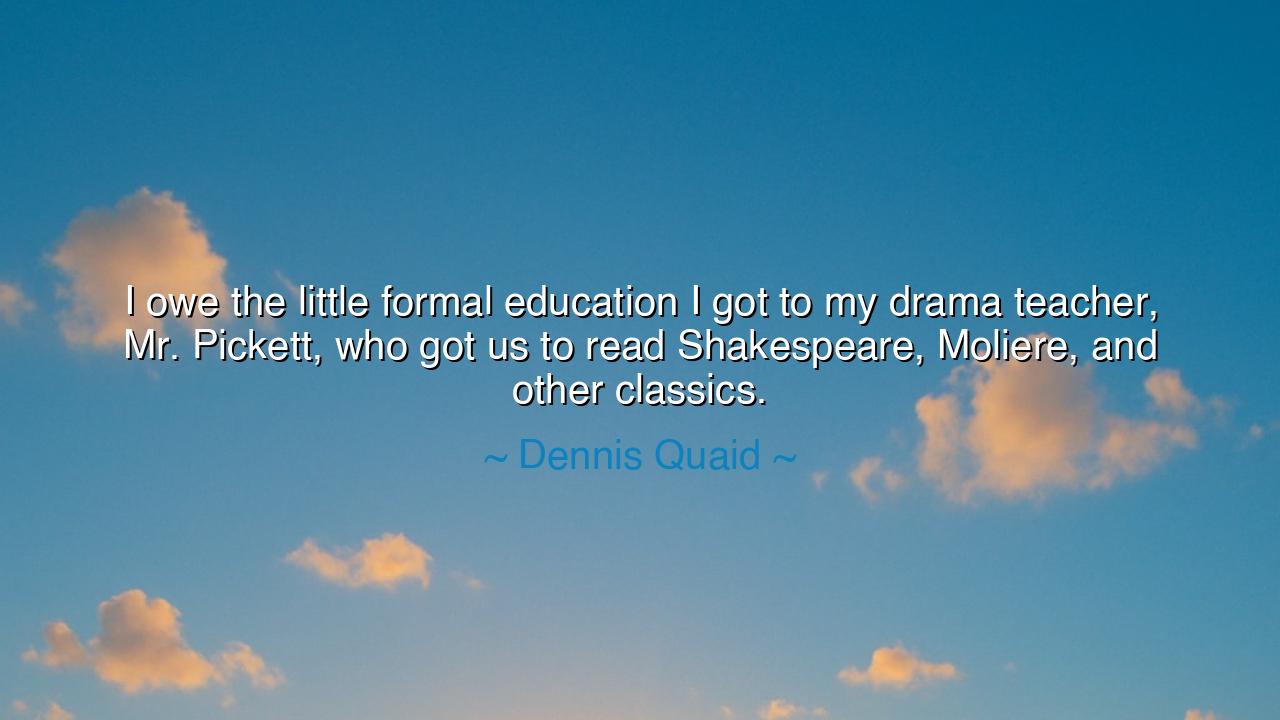
I owe the little formal education I got to my drama teacher, Mr.
I owe the little formal education I got to my drama teacher, Mr. Pickett, who got us to read Shakespeare, Moliere, and other classics.






Dennis Quaid, in remembering the path that shaped him, once said: “I owe the little formal education I got to my drama teacher, Mr. Pickett, who got us to read Shakespeare, Moliere, and other classics.” These words carry with them the weight of gratitude and the truth that sometimes a single teacher, a single mentor, can stand as the pillar upon which a young person’s destiny rests. Though Quaid humbly speaks of his "little formal education," what he reveals is that the wisdom of the ages, carried through the voices of the great dramatists, was placed in his hands by one who believed in the power of story.
The meaning of this reflection is twofold. First, it is a recognition that education is not measured by quantity but by depth. A single teacher, with passion and vision, can awaken the mind more than years of indifferent schooling. Second, it is a testament to the power of classics — works like those of Shakespeare and Moliere, which do not merely entertain, but train the soul in the rhythms of life, tragedy, comedy, and the eternal struggles of humankind. Mr. Pickett did more than assign readings; he gave Quaid a doorway into the universal, and in doing so, planted seeds that bore fruit in his art.
The origin of this wisdom lies in the truth that throughout history, the greatest figures often speak of one teacher who changed everything. Alexander the Great said he owed his knowledge of life to Aristotle, who introduced him to philosophy. Helen Keller credited her transformation to Anne Sullivan, who broke open the prison of silence and revealed the world of language. For Quaid, that guide was his drama teacher, who, by placing the voices of the ancients before him, allowed him to hear the echoes of timeless wisdom and to carry it into his craft as an actor.
History itself confirms the power of classics as teachers. When Abraham Lincoln, who had little formal education, taught himself from a few books, Shakespeare was among them. Those words shaped his speeches, his understanding of human character, and his vision as a leader. For Lincoln, as for Quaid, Shakespeare was not merely literature, but a mirror of the human soul. A teacher who directs a student to such works does not simply teach; he awakens.
In Quaid’s memory of his drama teacher, there is also a lesson about the role of mentors. True teaching is not only the transmission of knowledge but the recognition of potential. Mr. Pickett likely saw in his student not only curiosity but the spark of performance, and he offered him the food of the soul: the words of the greatest playwrights. It was through this nourishment that Quaid grew into the artist he would become. In this sense, a teacher becomes more than an instructor; he becomes a guardian of destiny.
The lesson for future generations is this: never underestimate the impact of one teacher, one book, or one moment of guidance. Education is not only in classrooms, but in the encounters that awaken the heart. To students: honor your teachers, for they may be the ones who shape your destiny in ways you cannot yet see. To teachers: know that your work is not in vain, for a single act of encouragement or the gift of a book may echo across lifetimes.
Practical action flows from this truth. Read the classics, not only for knowledge but for the shaping of your spirit. Seek out mentors who challenge and inspire you, and when life offers you the chance, become such a mentor for others. Carry gratitude for those who guided you when your path was uncertain, and let their wisdom live on through the way you live and the way you teach.
Thus, Dennis Quaid’s words remind us of the sacred chain of teaching, where the wisdom of the ancients flows through the hands of teachers into the lives of students, and from those students into the world. Education may be little in form, but great in substance, if it carries the fire of truth. Let us then honor our teachers, cherish the classics, and never forget that one guiding hand can lift a soul to greatness.






AAdministratorAdministrator
Welcome, honored guests. Please leave a comment, we will respond soon